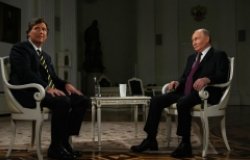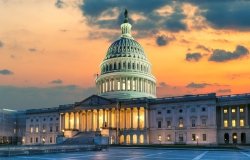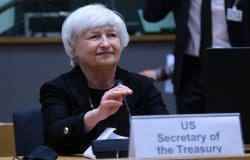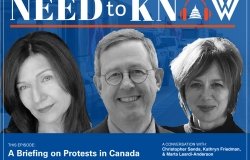Congress & Foreign Policy Remarks
Wilson Center Congressional Scholar
Before a Kissinger Institute Meeting
Of Chinese Scholars
Woodrow Wilson Center
April 3, 2015
I too want to welcome you to the Woodrow Wilson Center. Our namesake, Woodrow Wilson, was, as you may know, a scholar and a statesman. Before he became governor of New Jersey in 1911 and President of the U.S. in 1913, he was president of Princeton and before that a professor of government and history.
Wilson had much to say about Congress, the presidency, politics and government, which is best captured in two books. The first was based on his doctoral dissertation and published in 1885 with the title, “Congressional Government.” The second book, “Constitutional Government,” was published over two decades later, and was based on a series of lectures he delivered at Columbia University in 1907.
In his second book Wilson spent more time discussing the presidency and foreign policy. In between the two books the U.S. had emerged as a world power at the turn of the century, following the Spanish-American war, and the powerful modern presidency emerged with that development.
Wilson said in one of those 1907 lectures that the president “can never again be the mere domestic figure he has been throughout so large a part of our history….Our president must always, henceforth, be one of the great powers of the world, whether he act greatly and wisely or not….He must stand always at the front of our affairs, and the office will be as big and as influential as the man who occupies it.”
How did Congress fit into this new scheme of things? Even though the Constitution gives the president the power to make treaties, it also says that it should be “by and with the advice and consent of the Senate,” and that that two-thirds of the Senate must concur in any treaty for it to take effect as “the supreme law of the land.”
In his lecture, Wilson put his own twist on the treaty powers of the president and Senate. While recognizing that the president cannot conclude any treaty without the consent of the Senate, he said the president need not disclose any step of negotiation until it is complete.
Once it is, in his words, “the government is virtually committed,” and “whatever its inclination, the Senate may feel itself committed also.” In other words, the Senate would be left with little choice but to concur in the treaty.
However, in his subsequent lecture on the Senate, he provided a more nuanced and flexible view, one that recognized the political realities of the upper house of Congress. He recognized that the Senate’s leaders are its more conservative men who are likely “to magnify the powers and prerogatives of the body they represent,” and are not at all likely to look to the president for leadership, or to yield to the House upon any radical differences of opinion or purpose.”
And in a very telling passage, Wilson writes that in its dealings with the president the Senate has shown its pride of independence, its desire to rule rather than to be merely consulted, its inclination to magnify its powers and in some sense preside over the policy of the government.”
Wilson goes on to note that the attitude of “rivalry and mutual mistrust” between the president and the Senate has increased over the years, especially in foreign affairs, and this has become especially problematic “when, as sometimes happens, the ‘Senate is of one political party and the president of the other.” In that case he continued, the dictation of policy “may be based not on the merits of the question involved, but upon antagonisms and calculations of advantage.”
Wilson observed in that lecture that under such circumstances, the president would be well advised to be less “stiff and offish” and “act in the true spirit of the Constitution and establish intimate relations of confidence with the Senate on his own initiative” --
not waiting until after his plans are completed, “but keeping himself in confidential communication with the leaders of the Senate while his plans are in course.”
I have cited these passages from Wilson’s 1907 lectures because they were especially insightful and prescient, both with regard to his failure as president in 1919 to persuade the Senate to concur in the Versailles Treaty over differences about the proposed League of Nations, but because they speak to us today as well and President Obama’s difficulties not just with the Senate but the House, over both domestic and foreign policy matters.
Many point to two things as responsible for these tensions and difficulties: first, the president’s inclination to go it alone rather than engage Congress; and second, the fact that both houses of Congress are controlled by the Republicans, and that much of the difficulty is partisan or political.
These are both accurate assessments of what is going on, especially as the 2016 presidential election approaches, and with some senators jockeying for position to be the Republicans’ presidential nominee.
But I would suggest the more fundamental problem is what Wilson touched on, and that is the very nature of our two great institutions of power, the Congress and the presidency. Another Princeton professor of the early 20th Century, Edward S. Corwin, put it all nicely when he wrote that the Constitution is, and I quote, “an invitation to struggle for the privilege of directing American foreign policy.”
Think about that. The framers of the Constitution purposely designed a system of government in which the major branches would be in natural competition with each other to establish both domestic and foreign policies.
They specifically rejected the British system in which the prerogative powers of the monarch, when it came to foreign affairs, were absolute.
The Americans had overthrown the British monarchy and were not about to replicate it on these shores. They much preferred divided powers and checks and balances.
As James Madison, the “father of the Constitution,” put it in Federalist Paper Number 51, “Ambition must be made to counteract ambition.”
And he goes on to explain that if men were angels we wouldn’t need government, and if we were governed by angels we wouldn’t need external and internal controls on the government. But in framing a government administered by men over men, you must first enable the government to control the governed, and second to oblige it to control itself.
While the primary control on government is a dependence on the people, that is not enough: “Experience has taught mankind the necessity of auxiliary precautions.”
Thus our Constitution is interlaced with these auxiliary precautions of internal government controls on itself, with the Congress a check on the president, the president a check on the Congress, and the Supreme Court a check on both.
Interestingly, though, there was a debate from the earliest days of our Republic as to whether these checks and balances should apply to the conduct of American foreign policy as well as to its domestic policymaking.
The elements of the debate first appear in the Federalist Papers. One of the authors, Alexander Hamilton, who wrote the bulk of the chapters on the presidency, argued that an energetic executive was necessary to the quality of good government and especially “essential to the protection of the community against foreign attacks” and “against the enterprises and assaults of ambition, of faction, and of anarchy.”
Hamilton went on to argue that the presidency provided energy because of the office’s unitary character which clothed the president in the virtues of “decision, activity, secrecy and dispatch…vigor and expedition.”
While many have cited this passage as evidence that the framers of the Constitution intended for the president to be supreme in foreign affairs, others point out that the article was merely arguing for a single executive versus a council or committee of executives.
James Madison wrote most of the Federalist essays on the Congress, and in two of those essays defended the powers and prerogatives of the Senate, especially its role in foreign affairs. But that argument was being made to counter those who thought the more numerous and popular branch, the House of Representatives, should play a major role in foreign policy.
The argument over the role of president and Congress in foreign affairs came to a head when President George Washington issued what amounted to a neutrality proclamation by the U.S. regarding the war between France and Britain. Jefferson and Madison argued the president did not have authority to do so unilaterally while Hamilton argued that, in the absence of a declaration of war, the executive had full power to declare and enforce American neutrality.
Hamilton won the argument and the president issued the proclamation, though in deference to Jefferson he did not call it a “neutrality” proclamation.
In a letter to Jefferson, Madison said he always thought the right to decide such questions was “essentially and exclusively…vested in the legislature [for] declaring war in time of peace,” and in the president and Senate for “making peace in time of war.”
Theses dueling notions of how much power the two branches should wield in matters of foreign policy continue to this day, though the 20th century, with all its international wars, disputes and threats of mass destruction, have tilted the balance heavily in the president’s favor.
It’s probably safe to say that most Americans believe the president has exclusive power to formulate, pronounce and conduct American foreign policy….and most presidents probably think so too. It is only when a president gets us into an unnecessary war or makes some other colossal foreign policy blunder that the people reassess their support for the “imperial presidency” and the Congress strikes back to tamper down the ambitions of a unilateral presidency.
There is a long-running myth in America backing-up that view of presidential supremacy in foreign policy and it is captured in the saying that “politics stops at the water’s edge.”
In other words, that it is not proper for Members of Congress to take issue with a president’s foreign policies lest we be perceived by other nations as being weak, torn and non-supportive of the country’s chief spokesman on our foreign policy –the president.
Senator Arthur H. Vandenberg, a Republican from Michigan, as chairman of the Senate Foreign Relations Committee in 1947-48, advocated a bipartisan foreign policy. His approach was best captured in his oft-repeated by seldom heeded words, “We must stop politics at the water’s edge.”,
In his private papers published in 1952, Vandenberg further explained what he meant: “To me, ‘bipartisan foreign policy’ means a mutual effort under our indispensable two-party system, to unite our official voice at the water’s edge so that America speaks with maximum authority against those who would divide and conquer us and the free world.”
But Vandenberg goes on to make clear that he is not suggesting that Congress or the American people, for that matter, should shut up and go along with whatever the president says our foreign policy is. In his words: “It does not involve the remotest surrender of free debate in determining our position. On the contrary, frank cooperation and free debate are indispensable to ultimate unity….it simply seeks national security ahead of partisan advantage.”
And he concludes: “Every foreign policy must be totally debated (and I think the record proves it has been) and the ‘loyal opposition’ is under special obligation to see that this occurs.”
That is what you are currently witnessing in the United States with the U.S. Congress vigorously and rigorously debating just what our foreign policies are or should be --whether you are talking about the nuclear agreement with Iran, whether to authorize the president to use force against ISIS in Syria and Iraq, whether to give the president special trade promotion authority to conclude trade agreements with the nations of Asia and Europe, or whether to move toward normal diplomatic relations with Cuba.
On and on it goes. Congress is constantly and continuously engaged in those debates over American foreign policy and recognizes it has a special role in that regard because it is reflecting the views and opinions of the American people who elected them to represent their wishes in the policy arena.
I recall that some time after the namesake of the Wilson Center’s Kissinger Institute, former Secretary of State Henry Kissinger left office, he compared the Congress’s efforts to shape American foreign policy to 535 ants floating down the river on a log, each one thinking he was steering the log.
Perhaps that says more about uncontrollable nature of international crises than it does about the Congress, since it is not clear that even a single human being like the president can control the course and direction of that log as it careens down a raging river --which the current state of the world seems to be.
But as Secretary of State, Dr. Kissinger did have confidence that the U.S. could be a major contributor in shaping what he called “a new international order.” In a speech he gave to the Boston World Affairs Council in 1976, Dr. Kissinger said that if the opportunity for forging that new order is missed, “we shall live in a world of chaos and danger.” If it is realized on the other hand, “we will have entered a world of peace and progress and justice.”
But he added that we can only realize our hopes as a united people. “Our greatest foreign policy problem,” he went on, “is our divisions at home. Our greatest foreign policy need is national cohesion and a return to an awareness that in foreign policy we are all engaged in a common national endeavor.”
It would appear today that we have not yet realized that new international order of which Secretary Kissinger spoke, because we do seem to be living increasingly “in a world of chaos and danger.”
You might conclude that part of the problem is that we still have those divisions at home of which Dr. Kissinger spoke, instead of the national cohesion he desired. And, that when we do not speak with one voice through the president we only contribute to the problem rather than the solution.
I would suggest however, that Senator Vandenberg had it about right in saying that “frank cooperation and free debate are indispensable to ultimate unity,” so long as Congress remembers to put national security ahead of partisan advantage.
As we move toward our next presidential election in 2016 we will again be tested as a nation on whether we can maintain that proper balance between an open and robust debate on foreign policy during the campaign , on the one hand, and on the other hand, a unified and coherent
About the Author

Donald Wolfensberger
Former Director, the Congress Project, Wilson Center; Former Staff Director, House Rules Committee










